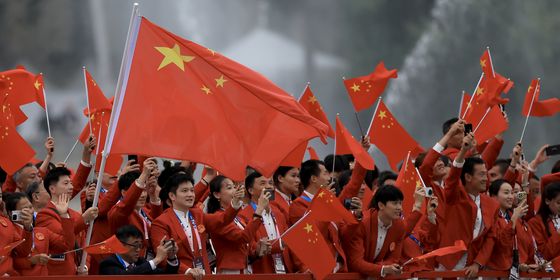A character of ever-changing fortunes
This summer is set to see record-high temperatures again due to global warming, scientists predict. While some seek refuge with an air-conditioner, others prefer resorts in the mountains or by the sea, enjoying beautiful scenery and a cool breeze.
The character 风 (fēng, wind) appeared on oracle bones over 3,000 years ago. Being invisible and intangible, wind couldn’t have many meaningful radicals, and was given the same pictorial form as its homophone 凤 (fèng), the character for the mythical phoenix. The outside radical, 凡, indicated its pronunciation. In the Qin dynasty (221 – 207 BCE), the character evolved into two separate seal-script forms: 鳳 (fèng) for the bird, and 風 (fēng) for the weather. Both were then later simplified, with and the phoenix becoming 凤 again, and the wind written as 风.
Words carrying 风 describe different types of draughts, including 微风 (wēifēng, breeze), 大风 (dàfēng, gale), 季风 (jìfēng, monsoon), and 台风 (táifēng, typhoon). Some are also metaphors: For instance, 春风 (chūnfēng, “spring breeze”) can also refer to a pleasant feeling, expression, or setting, as in 他近来很顺利,春风满面。( Tā jìnlái hěn shùnlì, chūnfēng mǎnmiàn. “Things have gone well for him lately, so his face is full of joy.”)
In the novel Romance of the Three Kingdoms, warlords Sun Quan and Liu Bei are forced to make an alliance to resist their rival Cao Cao, defending the Yangtze River with only 50,000 men against Cao Cao’s reputed army of 800,000. Sun’s top strategist, General Zhou Yu, came up with the idea to set fire to Cao’s ships, and had all the preparations ready except one last crucial element—wind to fan the flames. This oversight gave rise to the idiom 万事俱备,只欠东风 (wànshì jù bèi, zhǐ qiàn dōngfēng, “Everything ready except the East wind”), meaning a big flaw in an otherwise perfect plan. Thankfully, Liu’s strategist Zhuge Liang helped Zhou pray to the gods to summon the wind, and their alliance won the now-famous Battle of the Red Cliffs.
Wind is also often used to indicate trends in politics, business, or society: For example, 风雨交加 (fēngyǔ jiāojiā, “the wind howls and the rain pours”) describes a crisis, and 风平浪静 (fēngpíng làngjìng, “the wind has abated and the waves have calmed”) describes its opposite, as in 任何社会改革都不会是风平浪静的。(Rènhé shèhuì gǎigé dōu búhuì shì fēngpíng làngjìng de. “No social reform is plain sailing.”)
Wind is always on the move. Widespread trends and prevailing local practices are known as 风俗 (fēngsú, folk customs). When visiting a new area, one has to learn about its 风土人情 (fēngtǔ rénqíng, local conditions and practices).
Great importance has also been attached to 风气 (fēngqì), meaning the general mood, atmosphere, or morals of a community, as in 这里学习风气很浓 (Zhèlǐ xuéxí fēngqì hěn nóng. “There is a good climate for learning here.”)
For an individual, 风 can also refer to behavior, attitude, or temperament, such as 风度 (fēngdù, demeanor) or 风采 (fēngcǎi, bearing). For instance, 他很有学者风采。 (Tā hěn yǒu xuézhě fēngcǎi. “He has the air of a scholar.”)
Being strong as well as swift, wind has given rise to many other idioms describing quick movement or fast-changing trends. 风卷残云 (fēngjuǎn cányún, a whirlwind scatters wisps of clouds) means to make a clean sweep of something, typically food. 风靡一时 (fēngmǐ yìshí, fashion of the moment) is a fad, as in 这种时尚在中国曾风靡一时。(Zhè zhǒng shíshàng zài Zhōngguó céng fēngmǐ yìshí. “This fashion swept the country at one time.”)
For meteorologists, wind can signal changes in weather or climate. Metaphorically, changing winds also represent shifts in opinion or information. 风声 (fēngshēng, literally “the sound of wind”) is a word for intelligence that is not publicly available. Expressions related to this include 打探风声 (dǎtàn fēngshēng, fish for intelligence) and 通风报信 (tōngfēng bàoxìn, leak secret information), as in 防止有人给嫌疑人通风报信 (fángzhǐ yǒurén gěi xiányírén tōngfēng bàoxìn, avoid tipping off the suspect.) Unreliable intelligence is known as 风传 (fēngchuán, hearsay or rumor) and 风言风语 (fēngyán fēngyǔ, slanderous gossip).
To many Chinese, another important type of “wind” is 风水 (fēngshuǐ, literally “wind and water”), the traditional practice of determining auspicious locations for houses, businesses, tombs, and other structures. When paired with other natural elements, 风 can describe other environments: 风光 (fēngguāng, sights), as in 田园风光 (tiányuán fēngguāng, pastoral scene); and 风景 (fēngjǐng, scenery), as in 桂林风景如画。(Guìlín fēngjǐng rú huà. “The scenery of Guilin is as beautiful as a painting.”)
As an unbridled natural force, wind can lso wreak havoc on the environment. Accordingly, some wind-related expressions describe difficult situations. For instance, 风风雨雨 (fēngfēng yǔyǔ, literally “repeated wind and rain”) means a string of hardships, as in 六十年来的风风雨雨,一起涌上他的心头。(Liùshí nián lái de fēngfēng yǔyǔ, yīqǐ yǒng shàng tā de xīntóu. “He recalled the adversities of the last 60 years.”)
Amidst the winds of change, or 风云变幻 (fēngyún biànhuàn), you may face 狂风骤雨 (kuángfēng zhòuyǔ, violent storm) in your life. But as long as you have strong faith and enough courage, you can definitely 乘风破浪 ( chéngfēng pòlàng, ride the wind and cleave the waves), and achieve your goal.
On the Character: 风 is a story from our issue, “Wild Rides.” To read the entire issue, become a subscriber and receive the full magazine.













